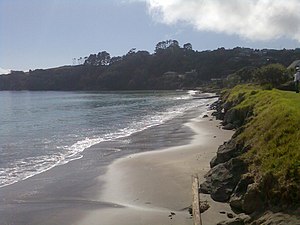Matakatia is a suburb situated on the Whangaparaoa Peninsula, towards the northern end of Auckland, New Zealand. It is about 43 kilometres (by road) north of the city centre.
Matakatia | |
|---|---|
 Tindalls Beach | |
 | |
| Coordinates: 36°37′15″S 174°46′45″E / 36.620720°S 174.779100°E | |
| Country | New Zealand |
| City | Auckland |
| Local authority | Auckland Council |
| Electoral ward | Albany ward |
| Local board | Hibiscus and Bays |
| Area | |
| • Land | 293 ha (724 acres) |
| Population (June 2024)[2] | |
• Total | 2,150 |
| Postcode(s) | 0930 |
| Tindalls Beach | Gulf Harbour | |
| (Polkinghornes Bay) |
|
Gulf Harbour |
| Manly | (Matakatia Bay) |
Kotanui Island, also called Frenchmans Cap, is a sharp triangular rock rising from the water about 1,000 metres offshore.[3]
History
editThe Waiau portage between Matakatia and Tindalls Beach allowed the movement of waka in the early 19th century.[4]
A road was developed through the area in 1938[5] and sections were sold the following year.[6]
The area to the north was Tindall's farm in the 1920s[7] and is now the suburb of Tindalls Beach.
Demographics
editTindalls-Matakatia statistical area, which includes Tindalls Beach, covers 2.93 km2 (1.13 sq mi)[1] and had an estimated population of 2,150 as of June 2024,[2] with a population density of 734 people per km2.
| Year | Pop. | ±% p.a. |
|---|---|---|
| 2006 | 1,548 | — |
| 2013 | 1,749 | +1.76% |
| 2018 | 1,977 | +2.48% |
| Source: [8] | ||
Tindalls-Matakatia had a population of 1,977 at the 2018 New Zealand census, an increase of 228 people (13.0%) since the 2013 census, and an increase of 429 people (27.7%) since the 2006 census. There were 723 households, comprising 981 males and 999 females, giving a sex ratio of 0.98 males per female. The median age was 47.8 years (compared with 37.4 years nationally), with 315 people (15.9%) aged under 15 years, 303 (15.3%) aged 15 to 29, 930 (47.0%) aged 30 to 64, and 429 (21.7%) aged 65 or older.
Ethnicities were 92.1% European/Pākehā, 6.1% Māori, 2.1% Pacific peoples, 5.6% Asian, and 2.1% other ethnicities. People may identify with more than one ethnicity.
The percentage of people born overseas was 32.3, compared with 27.1% nationally.
Although some people chose not to answer the census's question about religious affiliation, 49.2% had no religion, 40.1% were Christian, 0.5% were Hindu, 0.2% were Muslim, 0.3% were Buddhist and 2.1% had other religions.
Of those at least 15 years old, 378 (22.7%) people had a bachelor's or higher degree, and 192 (11.6%) people had no formal qualifications. The median income was $36,200, compared with $31,800 nationally. 423 people (25.5%) earned over $70,000 compared to 17.2% nationally. The employment status of those at least 15 was that 741 (44.6%) people were employed full-time, 276 (16.6%) were part-time, and 51 (3.1%) were unemployed.[8]
Notes
edit- ^ a b "ArcGIS Web Application". statsnz.maps.arcgis.com. Retrieved 6 June 2022.
- ^ a b "Aotearoa Data Explorer". Statistics New Zealand. Retrieved 26 October 2024.
- ^ "Drone operator captures incredible aerial footage of Auckland's Hibiscus Coast". Stuff. 2 November 2016.
- ^ "Unknown title". Auckland-Waikato Historical Journal (66–72): 27. 1995.
- ^ "Road Formation". New Zealand Herald. 26 March 1938. p. 5.
- ^ "Houses and Land For Sale". New Zealand Herald. 1 April 1939. p. 7.
- ^ Badham, Wallace (2009). The Iron-Bound Coast: Karekare in the Early Years. Oratia Books. p. 75. ISBN 9781877514012.
- ^ a b "Statistical area 1 dataset for 2018 Census". Statistics New Zealand. March 2020. Tindalls-Matakatia (115400). 2018 Census place summary: Tindalls-Matakatia